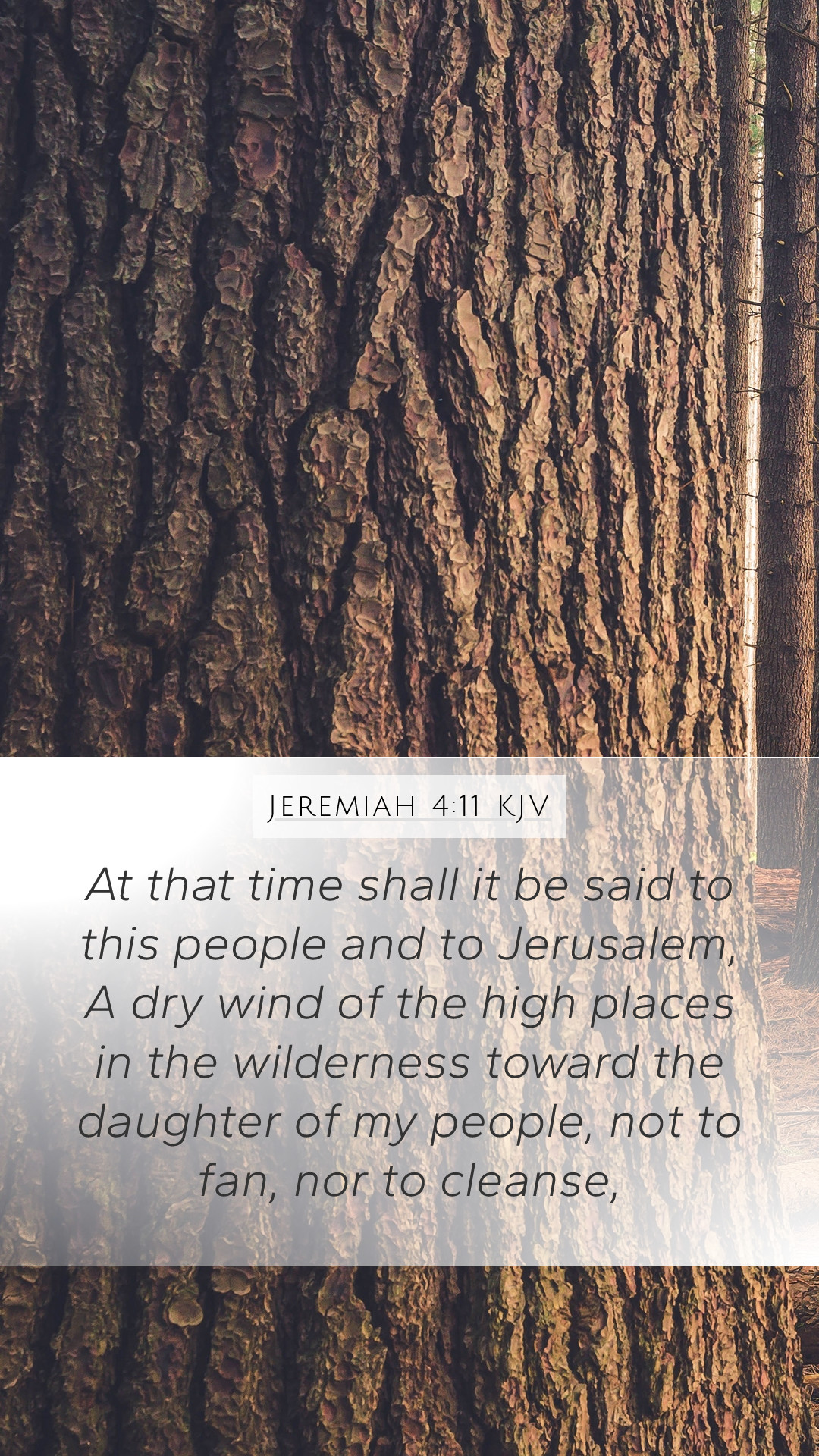Bible Verse Commentary on Jeremiah 4:11
The verse Jeremiah 4:11 speaks to the profound themes of warning and impending judgment, ultimately serving as a call to repentance. In this commentary, we explore the verse's meaning through the insights provided by renowned public domain scholars such as Matthew Henry, Albert Barnes, and Adam Clarke. Here, we aim to provide a comprehensive understanding of the scripture using various biblical study concepts.
Contextual Background
Jeremiah, known as the weeping prophet, conveys God's messages to the people of Judah, urging them to turn from their ways. The historical context of this verse, set during a time of great moral and spiritual decay, presents a clear picture of God's displeasure and the consequences of sin.
Scriptural Analysis
In Jeremiah 4:11, we see a critical metaphor used: "At that time it will be said to this people and to Jerusalem: A scorching wind from the barren heights in the desert blows toward my people, not to winnow or cleanse." This imagery conveys the futility of seeking safety or relief from external dangers; instead, it reflects the conclusions of impending disaster brought by a lack of true repentance.
Insights from Matthew Henry
Matthew Henry emphasizes that the "scorching wind" symbolizes the destructive forces that would come upon the people. He points out that this metaphor reflects the harsh judgments of God. The "barren heights" signify desolation, illustrating how the people of Jerusalem will experience the consequences of their unfaithfulness.
Albert Barnes' Interpretation
According to Albert Barnes, this verse highlights how external troubles are often a direct result of internal disobedience. He explains that the wind represents both troubles and judgments that sweep upon the land, reinforcing the idea that God does not merely allow calamity but uses it as a tool for correction. Barnes stresses that the intention behind the metaphor is to lead the people back to faithfulness.
Adam Clarke's Commentary
Adam Clarke expands on this interpretation by warning of the spiritual barrenness that results from rejecting God. His commentary suggests that the "scorching wind" signifies a time of trial that serves a dual purpose—bringing judgment while also offering a chance for renewal. Clarke encourages contemplation on how individuals can seek to restore their relationship with God amidst trials.
Key Themes
- Impending Judgment: The verse warns of severe consequences for continued disobedience.
- Call to Repentance: There is an implicit plea for the people to return to God.
- Symbolism of the Wind: Represents divine intervention and the nature of God's wrath.
- Spiritual Barrenness: Highlights the consequences of a life not aligned with God’s will.
Application of the Verse
In applying this verse to contemporary life, it serves as a reminder of the importance of genuine repentance. The warnings in Jeremiah 4:11 resonate today, prompting individuals and communities to reflect critically on their spiritual standing before God.
Practical Insights
- Self-Examination: Engage in personal reflection on one’s life choices.
- Community Guidance: Encourage Bible study groups to discuss themes of repentance and faithfulness.
- Continual Prayer: Seek divine guidance through prayer and reflection on scripture.
Cross References
The themes found in Jeremiah 4:11 connect with various other scripture passages, including:
- Isaiah 40:7: Illustrating God's judgment against the flower of the field in the face of His word.
- Hosea 8:7: Describing the consequences of sowing to the wind and reaping the whirlwind.
- Ezekiel 18:30: A call for the people to repent and turn from their offenses.
Conclusion
Jeremiah 4:11 gives us profound insight into God's heart regarding sin, judgment, and the desire for restoration. By deeply studying such verses through public domain commentaries, we gain vital understanding and tools for applying these timeless lessons in our lives today.
Further Study Resources
For further exploration, consider engaging with the following:
- Online Bible study platforms for group discussions.
- Bible study guides focusing on Old Testament prophets.
- Tools for in-depth scripture analysis and exegesis.


